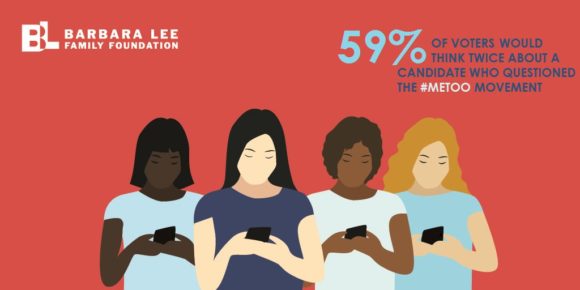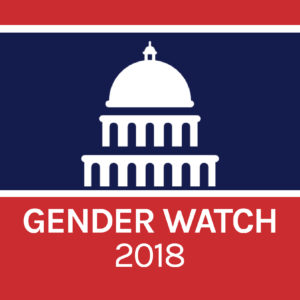
While #MeToo has amplified women’s voices and shed light on the reality that sexual harassment is a widespread problem that leaves no industry unscathed, the movement has also caused some to question its eventual result. Headlines like “The Rising Pressure of the #MeToo Backlash” and “Why the #MeToo Movement Should Be Ready for a Backlash,” and Sheryl Sandberg’s warning that she had “already heard rumblings of a backlash,” may lead some candidates to wonder what place sexual harassment and #MeToo should have on the campaign trail in 2018. For many, communicating about sexual harassment may feel new; not since the 1992 elections, a year after Anita Hill testified during Clarence Thomas’s confirmation hearing, has sexual harassment been such a dominant political issue.
Research released in April by the Barbara Lee Family Foundation (BLFF), Voters, Candidates, and #MeToo, shows that the majority of voters: take sexual harassment seriously; say that it will influence their voting decisions; and look more favorably upon candidates who take a strong stance against sexual harassment. Voters also say they would never vote for someone accused of sexual harassment or someone who did not make fighting sexual harassment a priority.
What does this mean for women candidates? There may be a gendered expectation that women candidates are out front on this subject and, for some candidates, shining a light on sexual harassment may be a personal campaign priority. New BLFF research, #MeToo: An Issue that Transcends Party, shows that voters are ready for women candidates to show that they are committed to fighting sexual harassment. The strongest candidate messages anchor on values, are non-partisan, and refer to the economic consequences women suffer as a result of sexual harassment in the workplace. At the same time, women candidates must be cautious about positioning themselves as the “more ethical” choice. Past BLFF research shows that voters historically give women a “virtue advantage” and punish them more for ethical infractions. Once knocked off the ethical pedestal, it can be difficult for women candidates to recover.
In this survey, voters also heard sample profiles of fictional Democratic and Republican women candidates. When the words “will fight against sexual harassment” are added to a standard partisan profile, both the Democratic woman candidate and the Republican woman candidate improve their performances among voters and increase voters’ positive feelings towards them. When a woman candidate of either party includes language about fighting sexual harassment in her profile, it increases support among many voting groups who are more inclined to vote for her in the first place.
Furthermore, voters think twice about a candidate who criticizes the #MeToo movement. When a candidate questions the #MeToo movement and the relevance of sexual harassment, it raises doubts about that candidate for a majority of voters and serious doubts about that candidate for a quarter to a third of voters. The message that raised the most doubts focuses on sexual harassment as a low priority compared to other issues; this message raised doubts for 64% of voters, and serious doubts for 36% of voters.
While partisanship remains important for candidates, it doesn’t tell the whole story. Women running on both sides of the aisle should keep in mind that this research shows sexual harassment is not a niche issue – it is one with the potential to make a real difference at the ballot box which could even be a deciding factor in a close race.


 From March to December 2018, the
From March to December 2018, the